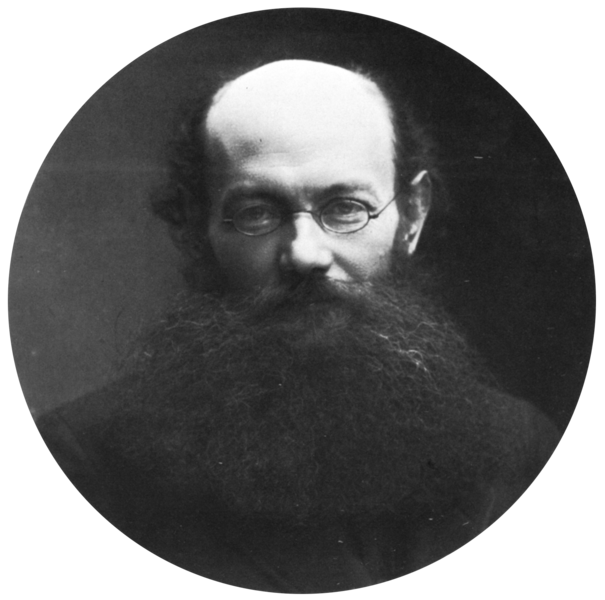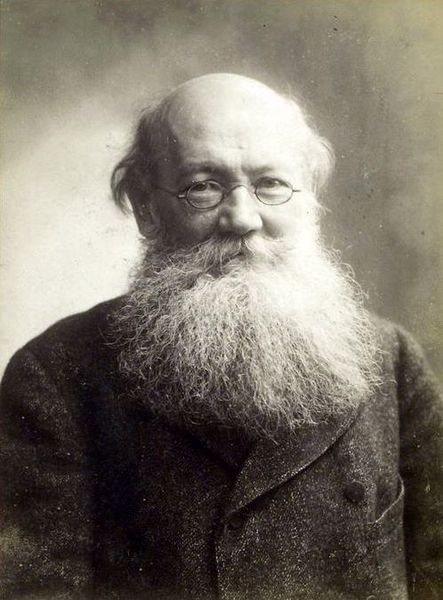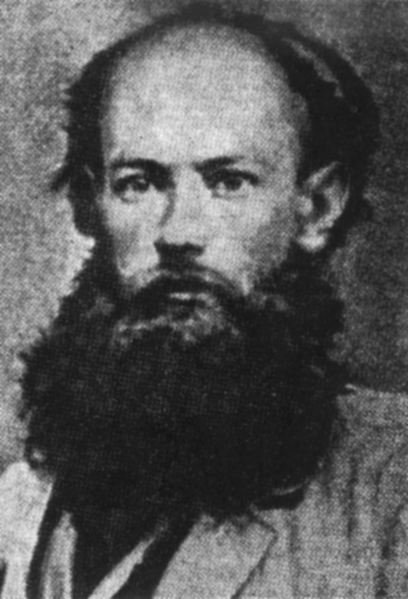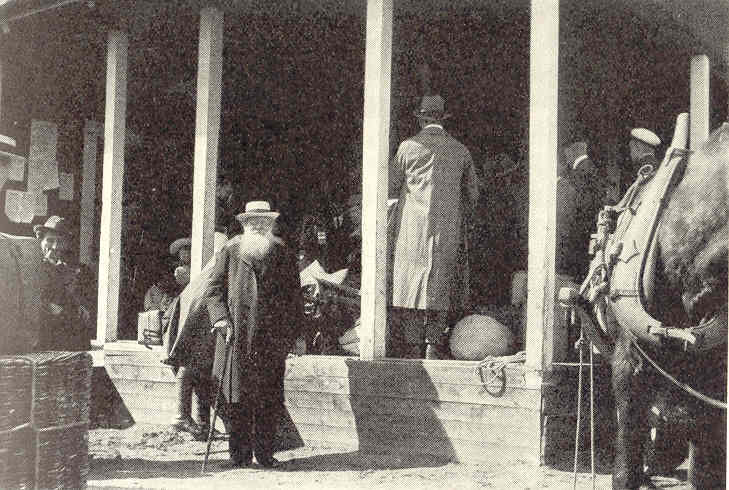<Back to Index>
- Chemist Fritz Haber, 1868
- Poet John Milton, 1608
- Anarchist Revolutionary Pyotr Alexeyevich Kropotkin, 1842
PAGE SPONSOR


Prince Peter (Pyotr) Alexeyevich Kropotkin (Russian: Пётр Алексеевич Кропоткин) (9 December 1842 – 8 February 1921) was a zoologist, an evolutionary theorist, geographer and one of the world's foremost anarcho-communists. One of the first advocates of anarchist communism, Kropotkin advocated a communist society free from central government and based on voluntary associations between workers. Because of his title of prince, he was known by some as "the Anarchist Prince". Some contemporaries saw him as leading a near perfect life, including Oscar Wilde, who described him as "a man with a soul of that beautiful white Christ which seems coming out of Russia." He wrote many books, pamphlets and articles, the most prominent being The Conquest of Bread and Fields, Factories and Workshops, and his principal scientific offering, Mutual Aid: A Factor of Evolution. He was also a contributor to the Encyclopædia Britannica Eleventh Edition in writing the article on anarchism.
Peter (or Pyotr) Kropotkin was born in Moscow. His father, Prince Alexei Petrovich Kropotkin, owned large tracts of land and nearly 1200 "souls" (male serfs) in three provinces. Kropotkin's male line traced to the legendary prince Rurik; his mother was the daughter of a Russian general. "[U]nder the influence of republican teachings," he dropped his princely title at the age of twelve, and "even rebuked his friends, when they so referred to him."
In 1857, at age 15, Kropotkin entered the Corps of Pages at St. Petersburg. Only 150 boys — mostly children of nobility belonging to the court — were educated in this privileged corps, which combined the character of a military school endowed with special rights and of a court institution attached to the imperial household. Kropotkin's memoirs detail the hazing and other abuse of pages for which the Corps had become notorious.
In Moscow, Kropotkin had developed an interest in the condition of the peasantry, and this interest increased as he grew older. In St. Petersburg, he read widely on his own account, and gave special attention to the works of the French encyclopædists and to French history. The years 1857 - 1861 witnessed a rich growth in the intellectual forces of Russia, and Kropotkin came under the influence of the new liberal - revolutionary literature, which largely expressed his own aspirations.
In
1862, Kropotkin was promoted from the Corps of Pages to the army. The
members of the corps had the prescriptive right to choose the regiment
to which they would be attached. For some time, he was aide de camp to the governor of
Transbaikalia at Chita. Later he was appointed attaché
for Cossack affairs to the governor general of East Siberia at Irkutsk. Administrative
work was scarce, and in 1864 Kropotkin accepted charge of a
geographical survey expedition, crossing North Manchuria from Transbaikalia to the Amur,
and soon was attached to another expedition which proceeded up the Sungari River into the heart of Manchuria.
The expeditions yielded very valuable geographical results. The
impossibility of obtaining any real administrative reforms in Siberia now
induced Kropotkin to devote himself almost entirely to scientific
exploration, in which he continued to be highly successful. In
1867, he quit the army and returned to St. Petersburg, where he entered
the university, becoming at the same time secretary to the geography
section of the Russian
Geographical Society. In
1871, he explored the glacial deposits of Finland and Sweden for the Society. In 1873, he published an
important contribution to
science, a map and paper in which he proved that the existing maps
entirely misrepresented the physical
features of Asia;
the main structural lines were in fact from south-west to north-east,
not from north to south, or from east to west as had been previously
supposed. During this work, he was offered the secretaryship of the
Society, but he had decided that it was his duty not to work at fresh
discoveries but to aid in diffusing existing knowledge among the people
at large. Accordingly, he refused the offer and returned to St.
Petersburg, where he joined the revolutionary party. He
visited Switzerland in 1872 and became a member of the International
Workingmen's Association (IWA)
at Geneva. It was there that he found that he did not like IWA's style
of socialism.
Instead, he studied the programme of the more radical Jura federation at Neuchâtel and
spent time in the company of the leading members, and definitely
adopted the creed of anarchism. On returning to Russia, he took an
active part in spreading revolutionary propaganda through the nihilist-led Circle of
Tchaikovsky. In 1873
Kropotkin was arrested and imprisoned in the Peter and Paul
Fortress.
He gained notoriety for his widely publicized escape from the prison in
1876, after which he went to England, moving after a short stay to
Switzerland, where he joined the Jura Federation. In 1877 he moved to
Paris, where he helped to start the socialist movement. In 1878 he
returned to Switzerland, where he edited for Jura Federation's
revolutionary newspaper Le
Révolté,
and published various revolutionary pamphlets. He was outspoken in his
beliefs that the peasants were being treated unfairly and deserved to
have the same land as the lords In 1881
shortly after the assassination of Tsar Alexander II,
the Swiss government expelled Kropotkin from Switzerland. After a short
stay at Thonon (Savoy),
he went to London, where he stayed nearly a year, and returned to
Thonon in late 1882. Soon he was arrested by the French government,
tried at Lyon, and sentenced by a police court magistrate (under a
special law passed on the fall of the Paris Commune)
to
five years' imprisonment, on the ground that he had belonged to the
IWA (1883). The French Chamber repeatedly agitated on his behalf, and
he was released in 1886. He settled near London, living at various
times in Harrow – where his daughter,
Alexandra, was born – Ealing and Bromley (6 Cresent Road 1886 - 1914).
He also lived for a number of years in Brighton.
While living in London, Kropotkin became friends with a number of
prominent English speaking socialists, including William Morris and George Bernard
Shaw. In 1902
Kropotkin published the book Mutual Aid: A
Factor of Evolution,
which provided an alternative view on animal and human survival, beyond
the claims of interpersonal competition and natural hierarchy proffered
at the time by some "social
Darwinists", such as Francis Galton. In
the animal world we have seen that the vast majority of species live in
societies, and that they find in association the best arms for the
struggle for life: understood, of course, in its wide Darwinian
sense – not as a struggle for the sheer means of existence, but as
a struggle against all natural conditions unfavourable to the species.
The animal species, in which individual struggle has been reduced to
its narrowest limits, and the practice of mutual aid has attained the
greatest development, are invariably the most numerous, the most
prosperous, and the most open to further progress. The mutual
protection which is obtained in this case, the possibility of attaining
old age and of accumulating experience, the higher intellectual
development, and the further growth of sociable habits, secure the
maintenance of the species, its extension, and its further progressive
evolution. The unsociable species, on the contrary, are doomed to decay. – Peter Kropotkin, Mutual Aid: A Factor of
Evolution (1902), Conclusion. Kropotkin's
authority
as a writer on Russia is generally acknowledged, and he
contributed to many articles. Most of the other 90 articles are about
various aspects of Russian geography. Kropotkin
returned to Russia after the February
Revolution and
was offered the ministry of education in the provisional government; he
rejected the post. His enthusiasm for the changes happening in the Russian Empire turned to disappointment
when the Bolsheviks seized power in the October
Revolution.
"This buries the revolution," he said. He thought that the Bolsheviks
had shown how the revolution was not to be made; by authoritarian
rather than libertarian methods. He had spoken out against
authoritarian socialism in his writings (for example The Conquest of
Bread), making the prediction that any state founded on these
principles would most likely lead to its breakup and the restoration of capitalism.
This prediction preceded the Revolutions of
1989 by nearly 100
years. He died on February 8, 1921, in the city
of Dmitrov, Moscow province, and was buried at the Novodevichy
Cemetery,
Moscow. Anarchists marched in his funeral procession carrying banners
with anti-Bolshevik slogans, at Lenin's approval, since he feared new
unrest otherwise. This was the last march by anarchists
until 1987, when glasnost saw them hold the first open free protest
against Bolshevik state Communism for over sixty years in Moscow. Kropotkin's
inspiration
has reached into the 20th and 21st centuries as a vision of
a new society based on the anarchist principles of anti-statism and
anti-authoritarianism, the communist principles of the publicly owned
means of production and his zoological theories on the mutual aid
between all species and individuals. It is often positioned as a
counter to the thinking of Trotsky, Lenin and Stalin which
tended to imply centralised planning and control. To a large degree
Kropotkin's emphasis is on local organisation, local production
obviating the need for central government. Kropotkin's vision is also
on agriculture and rural life, making it a contrasting perspective to
the largely industrial thinking of communists and socialists. In his
book Mutual Aid: A
Factor of Evolution, Kropotkin explored the widespread use of cooperation as
a survival mechanism in human societies through their many stages, and
animals. Written in accessible language, he used many real life
examples in an attempt to show that the main factor in facilitating
evolution is cooperation between individuals in free-associated
societies and groups, without central control, authority or compulsion. This was in order to counteract the
conception of fierce competition as the core of evolution,
that provided a rationalization for the dominant political, economic
and social theories of the time; and the prevalent interpretations of Darwinism. His
observations of cooperative tendencies in indigenous
peoples, pre-feudal, feudal and
those remaining in modern societies, allowed him to conclude that not
all human societies were based on competition such as those of
industrialized Europe;
and that in many societies, cooperation was the norm between
individuals and groups. He also concluded that in most pre-industrial
and pre-authoritarian societies (where he claimed that leadership,
central government and class did not exist) actively defend against the
accumulation of private property, for example, by equally sharing out,
amongst the community, a person's possessions when he has died; or not
allowing a gift to be sold, bartered or used to create wealth. In
another of his books, The Conquest of
Bread, Kropotkin proposed a system of economics based
on mutual exchanges made in a system of voluntary cooperation. He
believed that should a society be socially, culturally and industrially
developed enough to produce all the goods and services required by it,
then no obstacle, such as preferential distribution, pricing or
monetary exchange will stand as an obstacle for all taking what they
need from the social product. The king pin in this idea is the eventual
abolishment of money or tokens to exchange for goods and services. He
further developed these ideas in Fields,
Factories and Workshops. Kropotkin
points out what he considers to be the fallacies of the economic systems of feudalism and capitalism,
and how he believes they create poverty and scarcity while promoting privilege.
He goes on to propose a more decentralised economic system based on mutual aid and voluntary cooperation,
asserting that the tendencies for this kind of organisation already
exist, both in evolution and in human society. His focus on local production leads to
his view that a country should strive for self-sufficiency –
manufacture its own goods and grow its own food, lessening dependence
on imports. To these ends he advocated irrigation and growing under
glass to boost local food production ability.

